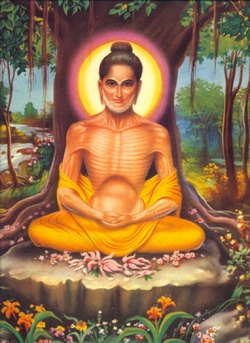The God idea in early Buddhism
The Buddha of the Pali suttas (scriptures) dismisses as “foolish talk?, as “ridiculous, mere words, a vain and empty thing? (Digha-Nikaya No. 13, Tevijja Sutta) the notion that Brahmins (the priestly caste), who according to the Buddha have not in fact seen Brahman face to face, can teach others how to achieve union with what they themselves have never beheld. This is not a denial of the existence of Brahman, however, but merely intended (by the Buddha) to indicate the folly of those religious teachers who would lead others to what they themselves do not personally know. Yet Brahma himself (see Brahmajala Sutta), for example, while not denied by the Buddha, is in no way viewed by him as a sovereign, all-knowing, all-powerful Creator God. Brahma (in common with all other devas) is subject to change, final decline and death, just as are all other sentient beings in samsara (the plane of continual and continuous reincarnation and suffering (Buddhism) suffering). Instead of belief in such a would-be Creator God as Brahma (a benign heavenly being who is in reality not yet free from self-delusion and the processes of rebirth), the wise are encouraged to practise the Dharma (spiritual truth) of the Buddha, in which right vision, right thinking, right speaking, right acting, right living, right effort, right attentive awareness, and right meditative absorption are paramount and are said to bring spiritual Liberation. The “God idea” forms no part of the “Pali” (or “agama”) Buddha’s doctrine of release from suffering - although some see in the “deathless realm of Nirvana” a hint of an impersonal, transcendental Absolute.
